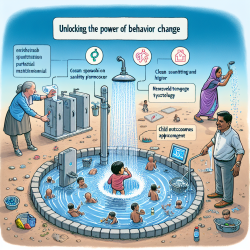In the realm of special education, particularly within the context of supporting individuals with mental retardation, understanding and addressing communication disorders is paramount. A groundbreaking study titled "Prevalence of Communication Disorders in an Institutionalized Mentally Retarded Population" by Barbara R. Brindle and James R. Dunster offers profound insights into the challenges and needs of this population. This research, conducted at the Huronia Regional Centre in Orillia, Ontario, screened 525 institutionalized individuals to estimate the severity of speech and language deficits, revealing that an overwhelming 96% exhibited a deficiency in one or more areas of communication.
The study's findings underscore the critical need for specialized communication interventions and the importance of equipping practitioners with the knowledge and tools to effectively address these challenges. Here, we explore how the outcomes of this research can be implemented to improve practitioner skills or encourage further research in this vital area of special education.
Understanding the Scope of Communication Disorders
The Brindle and Dunster study provides a comprehensive overview of the types of communication disorders prevalent among the institutionalized mentally retarded population. The data revealed that 78% of the individuals screened would require improvement in communication skills to function adequately outside of the institution. This highlights the essential role of speech and language therapy in facilitating greater independence and quality of life for this population.
Implications for Practitioners
For practitioners working in special education and speech-language pathology, the findings of this study offer several key takeaways:
- Priority Setting in Therapy: With the high prevalence of communication disorders among the mentally retarded population, practitioners must develop strategies for prioritizing therapy. The study's approach to categorizing individuals based on the severity of their communication deficits and their potential to benefit from therapy provides a valuable model for making these decisions.
- Adaptation of Screening Tools: The use of a specially developed screening instrument in the study, sensitive enough to indicate approximate levels of communication skills, highlights the importance of using appropriate assessment tools. Practitioners should consider adapting or developing screening instruments tailored to the specific needs of their clients.
- Therapy Techniques: The research underscores the necessity of employing a variety of therapy techniques to address the diverse needs of this population. Practitioners should be well-versed in a range of interventions, including those that target articulation, language development, voice disorders, and nonverbal communication systems.
- Interdisciplinary Collaboration: Given the complex nature of communication disorders and their interaction with other sensory, motor, and behavioral issues, practitioners must collaborate closely with other professionals. This interdisciplinary approach ensures comprehensive care and maximizes the potential for improvement.
Encouraging Further Research
The Brindle and Dunster study not only provides valuable insights for current practitioners but also highlights areas for further research. The changing characteristics of the institutionalized population, particularly with the trend toward deinstitutionalization, suggest a need for ongoing studies to understand better and address the communication needs of individuals with mental retardation. Future research could explore the effectiveness of specific therapy techniques, the impact of new technologies on communication interventions, and strategies for enhancing interdisciplinary collaboration.
Conclusion
The prevalence of communication disorders in the institutionalized mentally retarded population, as documented by Brindle and Dunster, calls for a focused and informed response from the special education community. By implementing the outcomes of this research, practitioners can enhance their skills, improve the quality of care, and contribute to the broader knowledge base through further research. As we strive to support individuals with mental retardation in achieving their full potential, understanding and addressing their communication needs remains a critical endeavor.
To read the original research paper, please follow this link: Prevalence of Communication Disorders in an Institutionalized Mentally Retarded Population.










